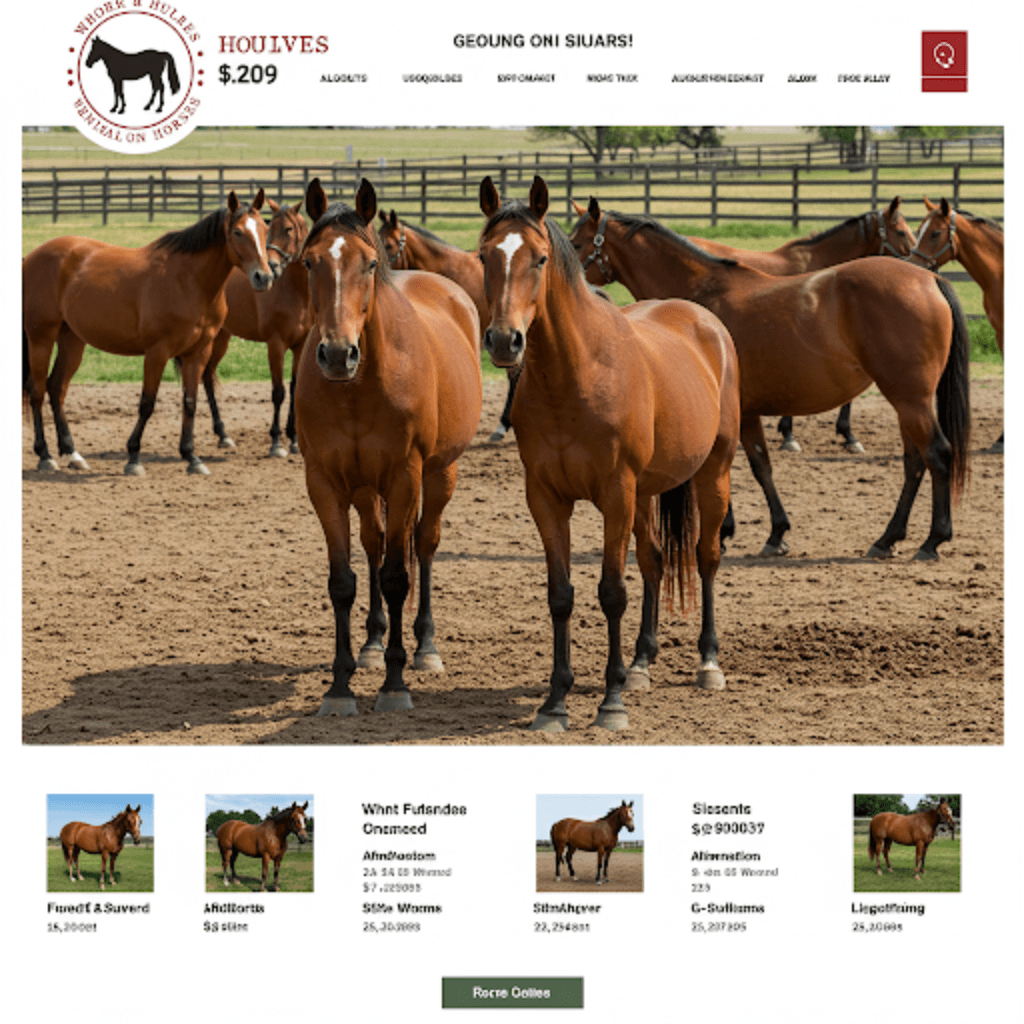
Navigating the world of horses for sale: A comprehensive guide
Buying a horse is a significant decision, a blend of excitement, responsibility, and substantial financial commitment. Whether you’re a seasoned equestrian or a first-time buyer, understanding the intricacies of the horse market is crucial. This guide provides a detailed overview of what to consider when looking for horses for sale, ensuring you make an informed and fulfilling purchase.
Defining your needs and expectations
Before diving into listings, take a step back and honestly assess your needs and expectations. This crucial first step will save you time, money, and potential heartache down the road.
- Riding experience: Are you a beginner, intermediate, or advanced rider? Be realistic about your skill level. A beginner needs a calm, well-trained horse, while an advanced rider might seek a more challenging mount.
- Intended use: What do you plan to do with the horse? Trail riding, competitive showing, dressage, jumping, or simply companionship? Different breeds and temperaments are suited for different disciplines.
- Budget: Horses come in a vast price range. Determine how much you’re willing to spend on the initial purchase, and factor in ongoing costs like boarding, feed, vet care, farrier services, and equipment.
- Time commitment: Horse ownership requires significant time. Consider how much time you can realistically dedicate to daily care, training, and riding.
- Living situation: Do you have your own property suitable for a horse, or will you need to board the horse? Boarding costs can vary significantly depending on location and amenities.
Where to find horses for sale
Once you have a clear picture of your ideal horse, it’s time to start your search. Several avenues exist for finding horses for sale:
- Online marketplaces: Numerous websites specialize in horse sales. These platforms offer a wide selection, allowing you to filter by breed, age, discipline, location, and price. Be sure to use reputable sites and proceed with caution.

- Breed-specific registries and associations: If you have a particular breed in mind, contacting the breed registry or association is a great way to find reputable breeders and horses for sale.
- Local barns and stables: Visit local riding facilities and inquire about horses for sale. Trainers and barn owners often have connections and may know of suitable horses.
- Horse auctions: Auctions can be a good place to find deals, but they require careful consideration. It’s essential to have a good understanding of horse conformation and to thoroughly vet any horse before bidding.
- Rescues and sanctuaries: Consider adopting a horse from a rescue organization. Many wonderful horses are looking for loving homes, and adoption fees are typically lower than purchasing from a breeder.
- Word of mouth: Let friends, family, and other equestrians know you are in market, sometimes a good option become available in this simple way.
Evaluating a potential horse
Once you’ve found a horse that seems like a good fit, thorough evaluation is crucial. Don’t rush this process.
- Initial assessment: Review the horse’s age, breed, sex, height, and overall appearance. Ask about its history, training, and temperament. Request photos and videos.
- In-person visit: Schedule a visit to see the horse in person. Observe its demeanor, conformation, and movement. If possible, watch the horse being ridden by its current owner or trainer.
- Riding the horse: If you’re a suitable rider for the horse, ask to ride it yourself. This will give you a feel for its responsiveness, training, and overall suitability.
- Pre-purchase exam: This is a critical step. Hire a veterinarian experienced with horses to conduct a thorough pre-purchase exam. This exam can identify any underlying health issues or potential problems that might not be apparent to the untrained eye. The vet will assess the horse’s overall health, soundness, and suitability for your intended use.
- Trial period: In some cases, the seller may allow a trial period, where you can take the horse to your own facility for a limited time to further evaluate it. This is particularly beneficial for first-time buyers.
Understanding horse breeds and disciplines
Different horse breeds are known for specific traits and aptitudes. Here are a few examples:
- American Quarter Horse: Known for their versatility, athleticism, and calm temperament. They excel in Western disciplines like reining and cutting, but are also popular for trail riding and general pleasure riding.
- Thoroughbred: Primarily known for their speed and athleticism in racing. They can also be retrained for other disciplines like jumping and eventing, but often require experienced riders.
- Arabian: Known for their endurance, stamina, and elegant appearance. They are popular for endurance riding, trail riding, and showing.
- Friesian: A striking breed known for their black coat, flowing mane and tail, and powerful build. They are often used in dressage and carriage driving.
- Morgan Horse: The Morgan is a very versatile horse, and they are very popular in shows, dressage, or even jumping. They are also family-friendly and often recommended for new riders.
- Warmbloods (various types): These horses are typically bred for specific sport disciplines like dressage and jumping. They are known for their athleticism, trainability, and temperament. Examples include Dutch Warmbloods, Hanoverians, and Trakehners.
Negotiating the price and finalizing the sale
Once you’ve found the right horse and completed the pre-purchase exam, it’s time to negotiate the price and finalize the sale.
- Price negotiation: Be prepared to negotiate the price, especially if the pre-purchase exam revealed any minor issues.
- Sales contract: Always have a written sales contract that outlines the terms of the sale, including the horse’s identification, price, payment terms, and any warranties or guarantees.
- Payment: Discuss payment methods with the seller. Common methods include cash, certified check, or wire transfer.
- Transfer of ownership: Ensure that all necessary paperwork, such as registration papers and health certificates, is properly transferred to your name.
- Transportation: Arrange for transportation of the horse to its new home. If you don’t have your own trailer, you’ll need to hire a professional horse transporter.
Ongoing care and responsibility
Horse ownership is a long-term commitment. Be prepared for the ongoing costs and responsibilities, including:
- Feeding: Horses require a balanced diet of hay, grain, and supplements.
- Boarding: If you don’t have your own property, you’ll need to pay for boarding, which can include stall space, pasture access, and feeding.
- Veterinary care: Routine checkups, vaccinations, deworming, and dental care are essential. Be prepared for potential emergency vet bills as well.
- Farrier services: Horses need regular hoof trimming and shoeing, typically every 6-8 weeks.
- Training and exercise: Regular training and exercise are crucial for maintaining the horse’s health, fitness, and well-being.
- Grooming: Regular grooming helps keep the horse’s coat and skin healthy and provides an opportunity to bond with your horse.
- Insurance: A very important topic to discuss with your insurance provider to make sure, you are covered in any situation.
Building a relationship with your horse
Owning a horse is more than just a financial transaction; it’s about building a partnership. Spend time with your horse, groom it, ride it, and learn its individual personality and quirks. With patience, understanding, and consistent care, you can develop a strong and rewarding bond with your equine companion.







